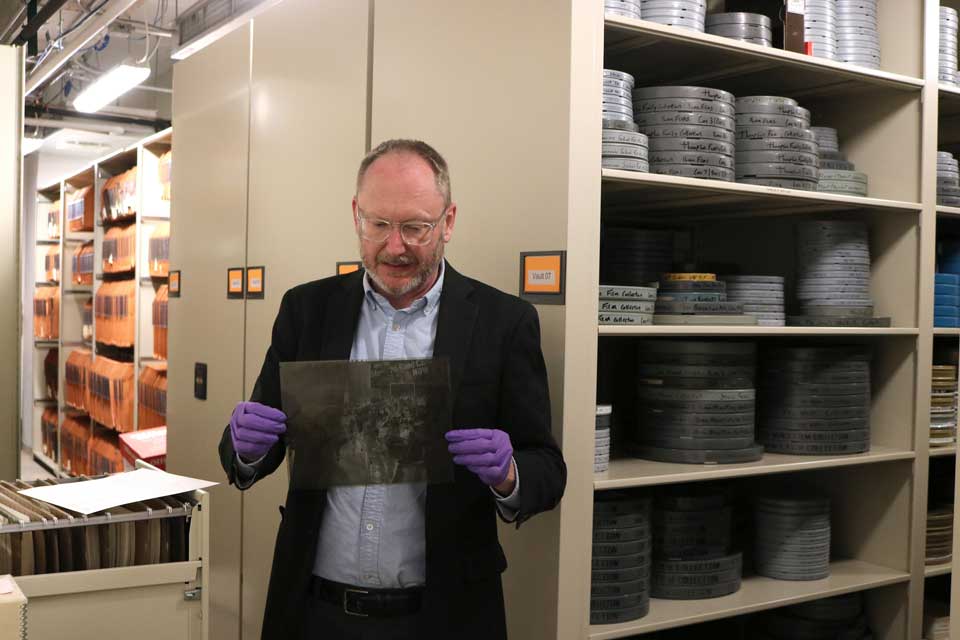Online Master’s Degree in Information Sciences (MS)
College of Communication & Information
Program Overview
Looking to earn your online master's degree in Information Sciences? The University of Tennessee, Knoxville offers an American Library Association (ALA) accredited, top-10 Master's program that is ideal for distance learners seeking a flexible, fully online learning environment.
Whether you're interested in working with big data as a researcher or as a children's librarian, the Master of Science (MSIS) online degree program can prepare you for an enriching career in the library and information sciences.
Credit Hours
36
Cost Per Credit Hour*
In-State $700
Out-of-State $775
Testing Requirements
No GRE
Field Experience
Optional
*Cost per credit hour is an estimate based on maintenance and university fees. Some programs may have additional course fees. Please contact your department for additional information on any related fees, and visit Tuition and Fees in Detail at One Stop.

Lead the Way in Information Sciences
Our American Library Association (ALA) accredited, top-10 Master’s in Information Sciences program prepares students to effectively manage, navigate, analyze, and turn information into action in public and private sectors. Organizations produce enormous amounts of data, and individuals with a Master of Science in Information Sciences degree are in high demand to organize, manage, and analyze this data and advise about the future. From academic librarian to user experience designer, our MSIS program can prepare you for an enriching career in the library and information sciences.
The dynamic field of Information Sciences (IS) encompasses careers of all types, settings, and disciplines such as data analysis, library science, user experience (UX) design, information architecture, corporate taxonomy, and many others. Careers in information and library sciences can be tailored to fit almost any goals you might have for your professional future.
The diverse nature of a MSIS degree from UT enables you to take your passion for information, technology, people, and/or libraries in any of hundreds of traditional and nontraditional directions, and can be applied to the setting that most excites you!
Information Science roles generally focus more on working with information as a strategic asset for organizations, ranging from nonprofits to corporations to government agencies and others. There is a wide array of careers in IS, which include data analyst, UX designer, corporate taxonomist, web content analyst, digital archivist, and more.
Library Science (LIS) roles are those found in a variety of settings, including school, public, and academic libraries. Individuals interested in an LIS career track can pursue a variety of positions, including (but not limited to) academic librarian, law librarian, school librarian, data curator, instruction librarian, and emerging technology librarian. Many of these careers require an ALA-accredited Master of Sciences in Information Sciences Degree.
If you love working with people; being part of high-performing teams; organizing information; researching hard-to-find information; and turning technology into solutions, systems, and strategic and actionable results you would excel in an IS career!
A career in information and library sciences may also be a good fit if you’re passionate about contributing to the common good, with some trajectories including working with children and early literacy, helping a community grow and thrive, or working with geographic information to identify patterns and emerging trends for grant-funded programs.
Or perhaps you have always wanted to do scholarly research; transform information into action, whether community-based, social, or political; or work with STEM resources?
Or maybe you are a numbers person at heart, ready to turn data into analytics that drive decisions and outcomes?
The common thread among information and library science careers is working with information. But beyond that, your interests and the skills you choose to develop throughout our IS program will determine what type of work you do.
As you go through the UT information sciences bachelors and/or masters programs you’ll be encouraged to “try out” as many different types of information work as you can to get a good sense of what most engages you. You will want to explore questions like:
- Do you prefer working with people, systems, technology, or data?
- Do you thrive in a team or more solitary environment?
- How do you feel about working with technology?
- Do you prefer a familiar routine or always-changing project work?
Why? Because the universe of information and library science careers offers all these options and more. Consequently, because the work you do and who you might do it for is so diverse, you can easily take your IS career in a new direction should you choose to do so.
Featured Courses
The MSIS at UT is a broad and interdisciplinary program. Here are just a few examples of the kinds of courses you can take based on your interests and career goals:
INSC 504: Research Methods in Information Sciences
Research methods in a variety of information environments; primary and secondary research; research project design; research results interpretation; analysis of published research; techniques supporting research process.
INSC 521: Cataloging and Classification
Basic library-oriented cataloging and classification techniques, tools, and supporting operations. Descriptive cataloging, choice and form of non-subject entries, subject heading work, general classification, authority control, bibliographic utilities, online library catalogs.
INSC 543: Spatial Data Management
Concepts related to spatial data management, including types of spatial data, spatial data discovery, data curation, and metadata creation. Issues related to research data management policies and related information services.
INSC 571: Children’s Materials
Critical survey of diverse children’s materials, for birth through age 12, in all formats and genres. Emphasis on evaluation, selection, and use in school and public libraries.

Program Career Pathways
Students in the Master of Science in Information Sciences program can use the following career pathways to craft their studies to best prepare them for their specific career goals and educational interests:
Academic Librarianship
Archives & Records Management
Assessment Librarianship
Data Curation & Data Management
Digital Collections
Geographic Information
Information Organization
Public Librarianship
Science Information
User Experience (UX)
Youth Services
Hiring Rates in the Field Prove Success
There is no better way to gauge the success of a program than to look at the employment journey of recent graduates; nearly 90% of graduates from the MSIS program are working in the Information Sciences field within one year of graduation.

“I couldn’t have imagined the kind of community I found in the University of Tennessee, Knoxville’s online MSIS program, in both fellow students and faculty. I’ve been supported through all my endeavors and have been able to pursue my passions and informational interests even when it required a more customized and interdisciplinary approach.”
-Esther D.